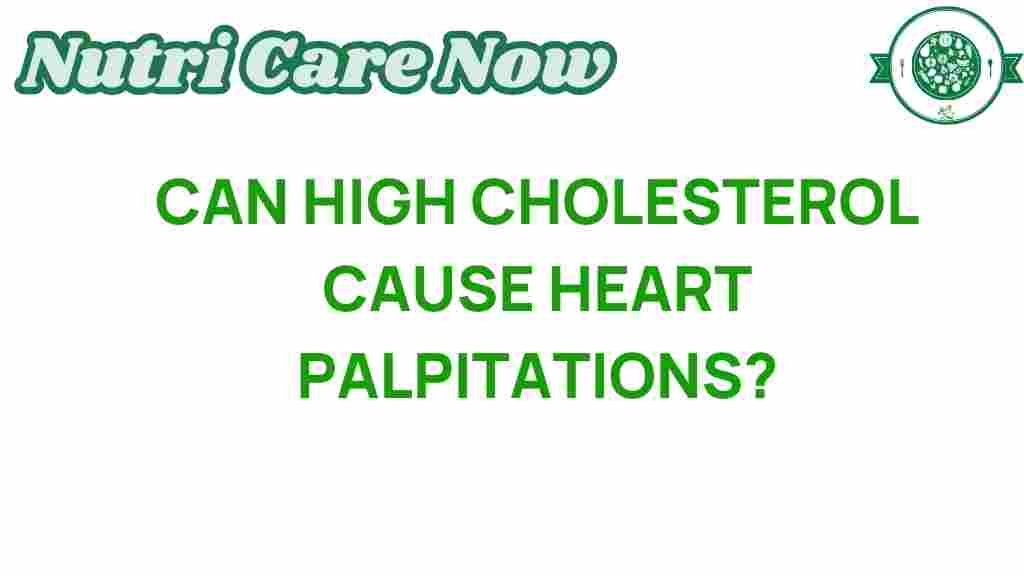Can High Cholesterol Trigger Unexpected Heart Palpitations?
Heart palpitations can be alarming, leaving many individuals wondering about their underlying causes. One often-overlooked factor that can contribute to heart palpitations is high cholesterol. In this article, we will explore the relationship between high cholesterol and heart palpitations, shedding light on cardiovascular health, symptoms, risk factors, lifestyle changes, and the importance of seeking medical advice.
Understanding High Cholesterol
High cholesterol occurs when there is an excess of lipids (fats) in the bloodstream. Cholesterol is a waxy substance produced by the liver and is essential for forming cell membranes and certain hormones. However, when cholesterol levels rise beyond normal limits, it can lead to serious health complications, including heart disease.
The Connection Between High Cholesterol and Heart Palpitations
Heart palpitations are sensations of a racing, fluttering, or pounding heartbeat. They can occur in response to various triggers, including stress, caffeine, or certain medications. However, high cholesterol can also be a contributing factor. Here’s how:
- Atherosclerosis: High cholesterol can lead to atherosclerosis, where plaque builds up in the arteries, narrowing them and making it harder for blood to flow. This can result in irregular heartbeats.
- Decreased Blood Flow: When arteries are narrowed, the heart has to work harder to pump blood, which can lead to palpitations.
- Heart Disease: High cholesterol is a significant risk factor for heart disease, which can manifest through symptoms like palpitations.
Recognizing the Symptoms of Heart Palpitations
Understanding the symptoms of heart palpitations is crucial for identifying potential issues related to high cholesterol. Common symptoms include:
- A racing heartbeat
- A fluttering sensation in the chest
- Lightheadedness or dizziness
- Chest discomfort or pain
- Shortness of breath
If you experience any of these symptoms, it is essential to consult with a healthcare professional to determine the cause and appropriate treatment.
Identifying Risk Factors for High Cholesterol
Several factors can contribute to high cholesterol levels, including:
- Diet: Consuming saturated and trans fats can raise cholesterol levels.
- Physical Inactivity: A sedentary lifestyle contributes to weight gain and high cholesterol.
- Obesity: Excess body weight is linked to higher cholesterol levels.
- Smoking: Tobacco use can decrease good cholesterol (HDL) levels.
- Genetics: Family history can play a significant role in cholesterol levels.
- Age and Gender: Cholesterol levels typically increase with age, and men are generally at greater risk at a younger age compared to women.
Making Lifestyle Changes for Better Cardiovascular Health
Improving cardiovascular health is essential in managing high cholesterol and reducing the risk of heart palpitations. Here are some effective lifestyle changes:
- Heart-Healthy Diet: Focus on consuming fruits, vegetables, whole grains, lean proteins, and healthy fats. Limit saturated fats and avoid trans fats.
- Regular Exercise: Aim for at least 150 minutes of moderate aerobic activity per week to improve heart health and lower cholesterol.
- Weight Management: Maintaining a healthy weight can positively impact cholesterol levels.
- Quit Smoking: Stopping smoking improves overall heart health and raises HDL cholesterol levels.
- Limit Alcohol: If you drink, do so in moderation. Excessive alcohol can lead to high cholesterol and blood pressure.
Seeking Medical Advice
If you are experiencing heart palpitations or have concerns about high cholesterol, it is crucial to seek medical advice. A healthcare provider can conduct tests, such as blood tests to measure cholesterol levels, and evaluate your overall cardiovascular health.
Diagnostic Tests for High Cholesterol
Healthcare providers use various tests to assess cholesterol levels and overall heart health:
- Lipid Panel: A blood test that measures total cholesterol, LDL (bad) cholesterol, HDL (good) cholesterol, and triglycerides.
- Electrocardiogram (ECG): This test records the electrical activity of the heart and can help identify irregular heart rhythms.
- Echocardiogram: An ultrasound of the heart that provides images to assess heart function and structure.
Troubleshooting Heart Palpitations
If you experience heart palpitations, here are some troubleshooting tips to consider:
- Monitor Triggers: Keep a diary of when palpitations occur and identify possible triggers, such as stress or caffeine.
- Practice Relaxation Techniques: Techniques such as deep breathing, meditation, and yoga can help manage stress and reduce palpitations.
- Stay Hydrated: Dehydration can lead to palpitations, so ensure you drink enough water throughout the day.
- Avoid Stimulants: Limit caffeine and nicotine, as they can exacerbate palpitations.
When to Seek Immediate Help
In some cases, heart palpitations can indicate a more serious condition. Seek immediate medical attention if you experience:
- Chest pain or discomfort
- Fainting or severe dizziness
- Shortness of breath
- Palpitations lasting more than a few minutes
Conclusion
High cholesterol can indeed trigger unexpected heart palpitations, acting as a significant risk factor for cardiovascular health. Understanding the symptoms, identifying risk factors, and making lifestyle changes are crucial steps in managing cholesterol levels and reducing the likelihood of palpitations.
Consulting with a healthcare professional for personalized medical advice is paramount. By taking proactive measures to maintain heart health, you can significantly reduce the risk of heart disease and enjoy a healthier life.
For more information on heart health and cholesterol management, visit this resource. Remember, your heart health is in your hands!
This article is in the category Health and created by NutriCareNow Team
